Hey, Hun: Sales, Sisterhood, Supremacy, and the Other Lies Behind Multilevel Marketing
A conversation with Emily Paulson about her forthcoming tell-all.
Today, I’m sharing a Q&A (and many cringe photos) with my friend, author, and former #bossbabe Emily Lynn Paulson. I met Emily through the online recovery world years ago, but until 2020-ish, I had no idea that she worked in network marketing or an MLM. And Emily was not just part of one; she was one of the winners: a very small percentage of folks who actually made a profit. When we became close, she had just left hers and was becoming adamant about talking about the predatory behavior she witnessed and participated in while there. When she told me she’d written a book about it and asked if I wanted to read a rough draft, I said, OF COURSE, because I was so curious. In recent years, documentaries like LuLaRich (about LuLaRoe), The Vow (about NXIVM), and Betting on Zero (about Herbalife), and podcasts like The Dream have pulled the curtain back on cult-like dynamics of MLMs and I, for one, have been obsessed with these stories.
I wasn’t prepared for Emily’s account, though. Despite her sharing it with me as a Google doc, which meant I had to read it on my fucking computer or on my teeny phone screen, I devoured it in two days. Here’s the endorsement I gave:
Hey, Hun will be released NEXT WEEK, on May 30. Preorder it now so it arrives on your doorstep that day. Clear your schedule and pop the popcorn.
An important note: I’m sure there are people who read this who are in MLMs. I have close friends and family members who are as well. Publishing this interview and my endorsement of Emily’s book is not about calling out individuals but rather raising awareness of the system as a whole. Similar to how I discuss alcohol culture and the alcohol industry.
Also, I’ll be in conversation with Emily about the book on June 14 at 7 pm at Newtownville Books. Come see us!
Here’s my conversation with former #bossbabe Emily.
Let’s get this out of the way off the bat. Have you had any death threats about this book yet (jk but not jk)?
Ha, not exactly death threats, but people are pissed for sure; they are definitely on the defense. I still have many friends who are in my former company (and other companies), and people are pretty freaked out about this book coming out. I get it. It challenges what they need to believe to stay in the scam.
But seriously, I know you’ve already had quite a lot of “feedback” online. What are the most common criticisms of putting this book out there, and how do you respond to them?
The criticism is ALWAYS—and I mean 100 percent always—from people who have never, and probably will never, read the book. And it makes sense because you’re taught never to question what you’re told and that any dissent is “hate.” The criticisms are usually along these lines:
My MLM is different.
Just because you had a bad experience doesn’t mean everyone does.
You are wrong; there’s nothing backing up your claims.
Which of course, as you know from reading the book, I address all of these. All MLMs are the same, the system is designed for 99.7 percent of people to fail, and all of my research is fact-checked and fully supported.
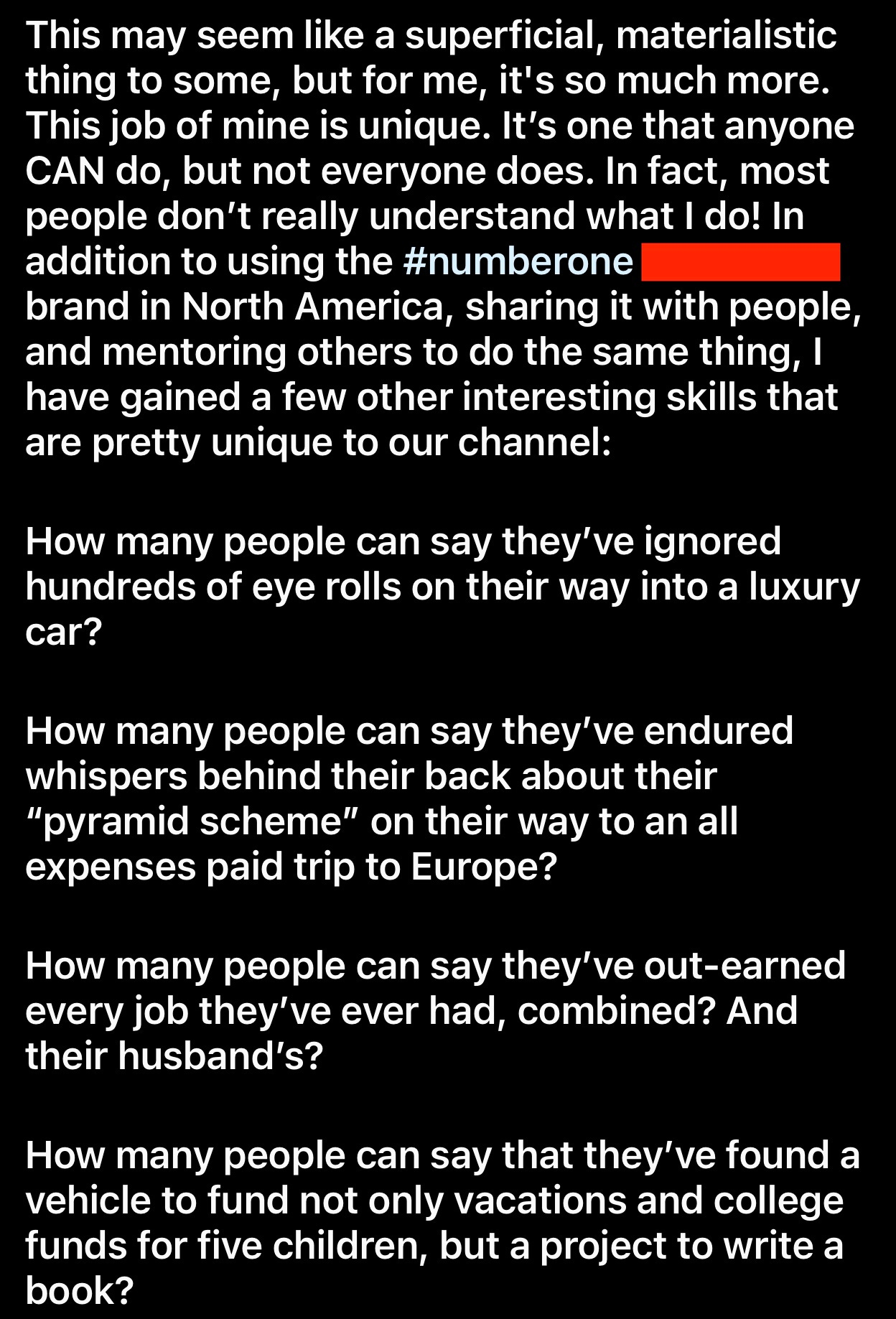
This is a tricky subject because almost all of us (self-included) know people in MLMs, and I have felt bad at times talking about and promoting the book as much as I have because I don’t want to offend or shame them. Still, at the same time, I see this industry as so clearly problematic. How do you suggest readers work with that tension? Who’s the bad guy here?
I have lost count of the number of people who love the book but are afraid to share it because they don’t want to offend or distance anyone. But here’s the thing: by being “nice,” especially as women, we uphold systems that oppress us. Full stop. The key is asking more questions. Ask yourself how you can support your loved ones without keeping them more stuck in their commercial cult. Ask how you can express your concern or even get them to ask more questions themselves. Staying quiet about what you know “to be nice” keeps them trapped in the insular world of the MLM. Just like sharing facts about alcohol, for example, how can people have informed consent if they aren’t informed? And as a friend and a consumer, you can be part of that information. If someone feels shame about facts you share, a lifestyle you lead, or any other choice you make (such as sharing this book), it says so much about them. After all, if they TRULY feel ok about what they are doing, your opinion shouldn’t matter. Their reaction speaks volumes because feeling shamed and being shamed are two different things.
I was honestly so surprised reading the book. I expected it to be a good story, but I did not expect it to be so enthralling and informative. You were able to weave so much cultural context into it, particularly around supremacy, which is part of the subtitle. Can you talk about what you mean by “supremacy” and how that shows up in MLMs?
It’s incredible to me how many people are triggered/offended/shocked that I use the word Supremacy in the title. Nobody wants to hear this, but (gasp) our country was built on white supremacy. We cannot divorce ourselves from it; it’s the sea we are swimming in. It’s why people in poverty tend to stay in poverty, for example, because we have very ‘pull yourself up by the bootstraps’ ideals about the American dream, even though not everyone has the same advantages.

MLMs rely on this meritocracy, that you will succeed if you work hard. But mathematically, it absolutely cannot work that way. So when people ultimately fail (like 99.7 percent of people do, regardless of how hard they work), they are blamed for it. You don't have a chance if you don’t have money and an extensive network of people with money. Plus, the entire system of MLM is based on ranks, rewards, and prizes, meant to keep you chasing up an endless ladder, and requires collecting other humans to achieve that goal. “Be the best at all costs,” even if it requires stepping on others and financially exploiting them, is the message of supremacy culture and MLM culture.
You were one of the people who “made it” in your MLM; over the course of your time (7 years?), you made over a million dollars, but this is not the norm at all. Why do you think you were successful, and what is the rate of this type of success/how much do most people earn? And why do so many still go in and stay in–year after year–with those statistics?
Almost seven years, yes. And yes, I earned over a million dollars in commissions. But even this is smoke and mirrors because that figure is before taxes, before expenses, and calculated over that entire time period (I explain the financials in the book, it’s pretty shocking). But you’re right. This is NOT the norm. I was in the top 2% after a year, then 1%, then .05%, etc., and instead of being surprised that there were so few people earning as much as me, I was led to believe it was an honor because I worked so hard. Most people (again, 99.7 percent of people) do not earn a DIME or lose money. Since all MLMs require a financial buy-in, you are in the red from the beginning, and most people never get in the black. As far as success, I guess it depends on how you define success. I defined it as earning money for a long time, but now I don’t see it that way. Because I was only ‘successful’ in that model since so many of the people I brought in were losing money. When people say, “But so-and-so made bank in her MLM!” as proof of success, my question is, “How is her team (downline) doing?” Because they are likely all losing money.
I was also set up for ‘success’ because I got in early before my town and network were saturated; I had money and a network of people with money. The reason people stay in, even though they lose, is usually due to a sunk cost fallacy, delusional hope, and varying levels of coercive control. Hope is preyed upon constantly because you’re told that you only fail if you quit and that you should keep pushing, one more month, then another. You’re told that you need to spend money to make money. You are love bombed in lieu of any profit, so you will stay in. You are led to believe that your hard work will lead to success, and if you quit, you will lose your chance and your network of MLM friends. The cost of leaving (socially, mentally, and emotionally) seems higher than the cost of staying.
I often hear or see “XYZ is different” when someone talks about their MLM. Are any of them actually different?
No, they’re all the same. While different products, promotions, or pay levels may exist, those are all semantics. It’s the “multi-level” part that makes them all the same. Any scheme that requires joining A PERSON and rewards you for recruiting PEOPLE is a multi-level marketing scheme. That is the exploitative part. That is the one throughline.
If someone says their company is different and yet asks you to join their “team,” you know you have a multi-level marketing scheme on your hands. There is a financial benefit to recruiting you. That is the scheme. And for those who say, “But I don’t have a team; I just sell products!” They themselves are part of the upline that recruited them, who makes money off of all of their sales. They are still part of the system of exploitation.
One of the wildest parts of your story is that you were encouraged to use your cancer and sobriety (among other hardships) to sell the company. Can you talk about how this happens?
MLMs are all about exploiting vulnerabilities.
Say you’re a new mom, feeling insecure about 1) the weight you gained during pregnancy and 2) you’re exhausted. You’re also 3) lonely and 4) feeling guilty or overwhelmed about the prospect of returning to work full-time. These are four common, obvious vulnerabilities there that are constantly exploited by MLMs. You are literally taught inside the MLM to address these exact pain points—you’re given scripts for them.
So, as this new mom, you hear from another mom who tells you she’s been there and she has the most perfect, life-changing opportunity that will fix it all.
She’ll sell you by saying:
These products (shakes, vitamins, workouts) totally helped her “get her pre-pregnancy body back”
She has more energy than ever now because of said products, but also because she feels so empowered and unencumbered by a nine-to-five
She has all the time in the world to spend with her baby now because she found a “business” that she can run in her spare pockets of time, and it’s so simple, so easy. No more guilt! No more overwhelm!
And the sisterhood! She’s now surrounded by the most amazing women who have achieved incredible results and get to do amazing things like go on these work trips “for free”! She’s supported, connected, and having so much fun.

This is precisely what happened to me, and I didn’t see it as preying on my vulnerabilities at the time. I thought someone had really offered me the most incredible opportunity, and what happened over time was it normalized this kind of selling and thinking. So I just went ahead and did the same thing to other women, believing that I was offering them what I’d been so lucky to receive.
This infiltrated my thinking to such a degree that when I was in the hospital for cancer and it was suggested that I share what I was going through on social media—noting how supported I felt by my team, how lucky I was to be part of such an incredible company (with the subtext that it would most certainly boost sales because of my condition)—I didn’t even flinch.
Similarly, after I got sober, I was invited to share my story at company-wide events, it played right into the part of me that needed purpose and wanted to be of service, but the reality was I was being exploited.
Speaking of sobriety, getting sober was your big turning point in seeing what was happening inside you and inside the business. Can you talk about how the culture of the MLM impacted your drinking and why getting sober was such a turning point? What specific things did you notice when you stopped drinking?
The MLM gave me an excuse to drink more, and drinking gave me an excuse to “sell” more. I was already frequently escaping with wine, so this gave me more of an excuse to drink “with clients” or at retention events. It made a problem that was already there even worse, and my drinking was always encouraged by everyone in the MLM because they were drinking too.
It allowed me to be bold and say things I wouldn’t usually say, send messages I normally wouldn’t, and basically bully people into buying shit from me. So, almost immediately after getting sober, not only could I not drink with clients or at events, I noticed I couldn’t send cringy cold messages anymore. I couldn’t bring myself to post on social media about the MLM anymore. It felt so disingenuous. My intuition started to come back online.
Are there any upsides to your time in “Rejuvenat” aside from earnings?” Anything you took away from it that was positive? I guess I’m asking, are there circumstances under which you would advise someone to join an MLM?
There is absolutely NO circumstance in which I would advise someone to join an MLM. NONE. I equate it to drinking: it’s not like something bad happened every time I drank, and I had some good times, but I would never drink again because overall, it was bad. Did good things come out of the MLM? Of course. I met people I’m still friends with. It gave me a platform that I still benefit from today. I went on some pretty cool trips. It sent me to rock bottom, which led me to getting sober, which led me into a field of recovery advocacy, etc. We can never know how our lives would have turned out if we had taken a different path, but it doesn’t mean that I believe the MLM created those good things. Those good things may very well have happened anyway. So, to reiterate, I would never advise joining an MLM. Have I mentioned NEVER JOIN AN MLM???
For anyone who’s reading this and working in an MLM right now: what do you want to say to them?
Hi, I don’t dislike you! Regardless of how I feel about the industry, I am not anti-MLM people. I have many friends in MLMs. I understand why people join them on a level that many people would never understand. Ultimately, systemic deficits leave us bereft of options, making MLMs seem like a good choice. So don’t feel called out; that’s the first thing.
I would also say: have an open mind. I recommend doing a profit loss statement and keeping track of all of your expenses, taxes, and commissions. Then, do one for your team if you have one. Be more critical of the information you get and where it comes from.
Ask yourself the following questions:
Who benefits from the work I do and the things I believe?
Has my involvement in the MLM changed any relationships?
How do I respond when people are critical of my MLM, and why?
Ultimately, leave room for the possibility that you may not be 100 percent correct about this, and be open to reading my book! What’s the harm in learning more? Your answer to that question might be the most telling of all.
I’ll be back in your inbox soon!
xo,
Laura
You are reading Love Story, a weekly-ish newsletter about relationships, recovery, and writing (with a heavy dose of Taylor Swift) from Laura McKowen. I’m also on Instagram, and have written two books. I love engaging with you in the comments, which are open to paid subscribers, and you can subscribe here or give a gift subscription here.
Offerings & Events
NEW: I’ll be at Kripalu from October 20-22 for a weekend retreat. Registration is now open.
Push Off from Here is available everywhere books are sold. Grab it!
I’ll be keynoting the Women for Sobriety annual conference on Friday, June 9. This is a weekend-long virtual conference, and you can get $20 off the registration fee by entering PUSHOFF at checkout. Learn more & register.
If you need sobriety support, The Luckiest Club's doors are always open.
Join me at The Art of Living in Boone, NC, July 21-23 for a weekend retreat.




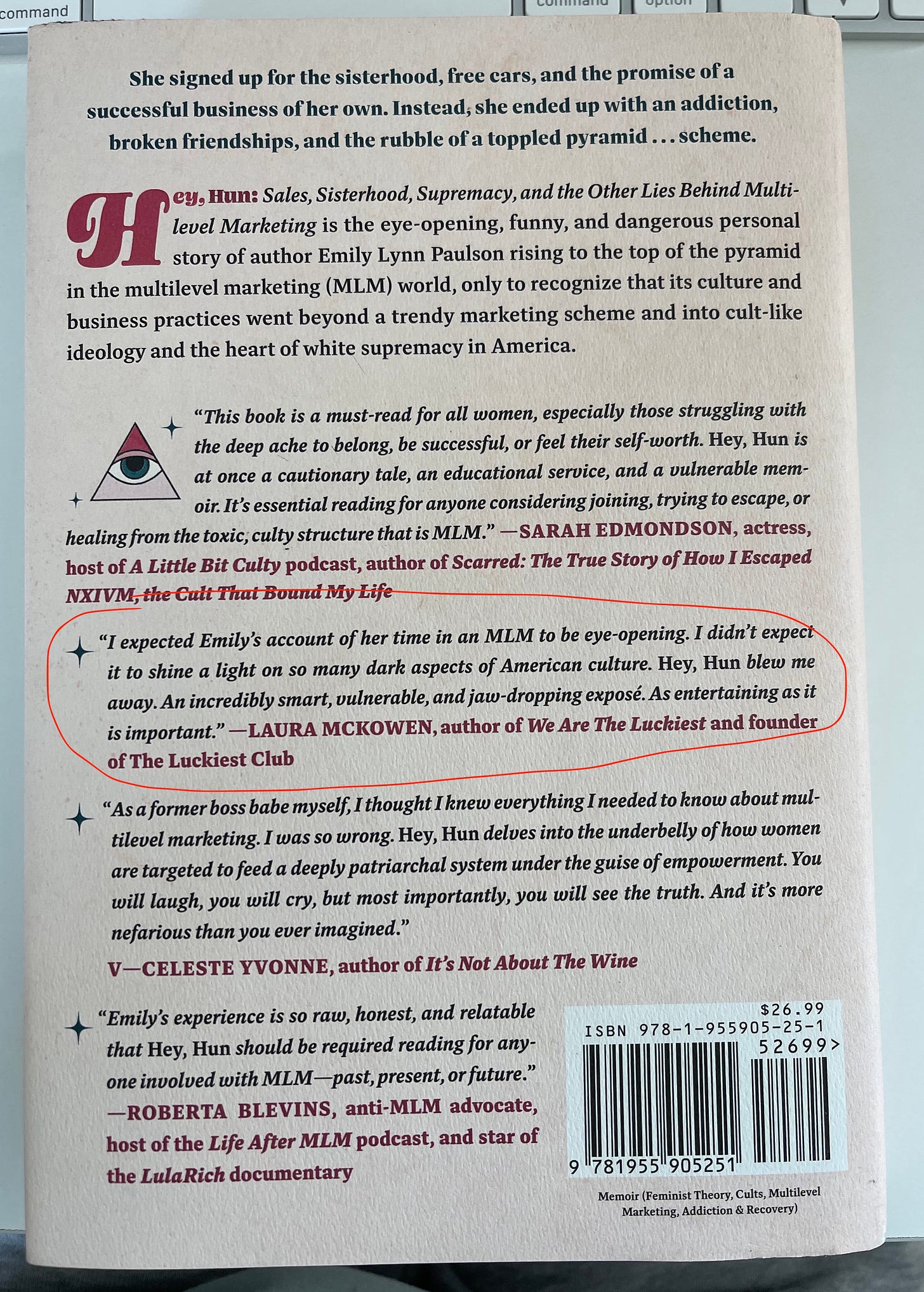



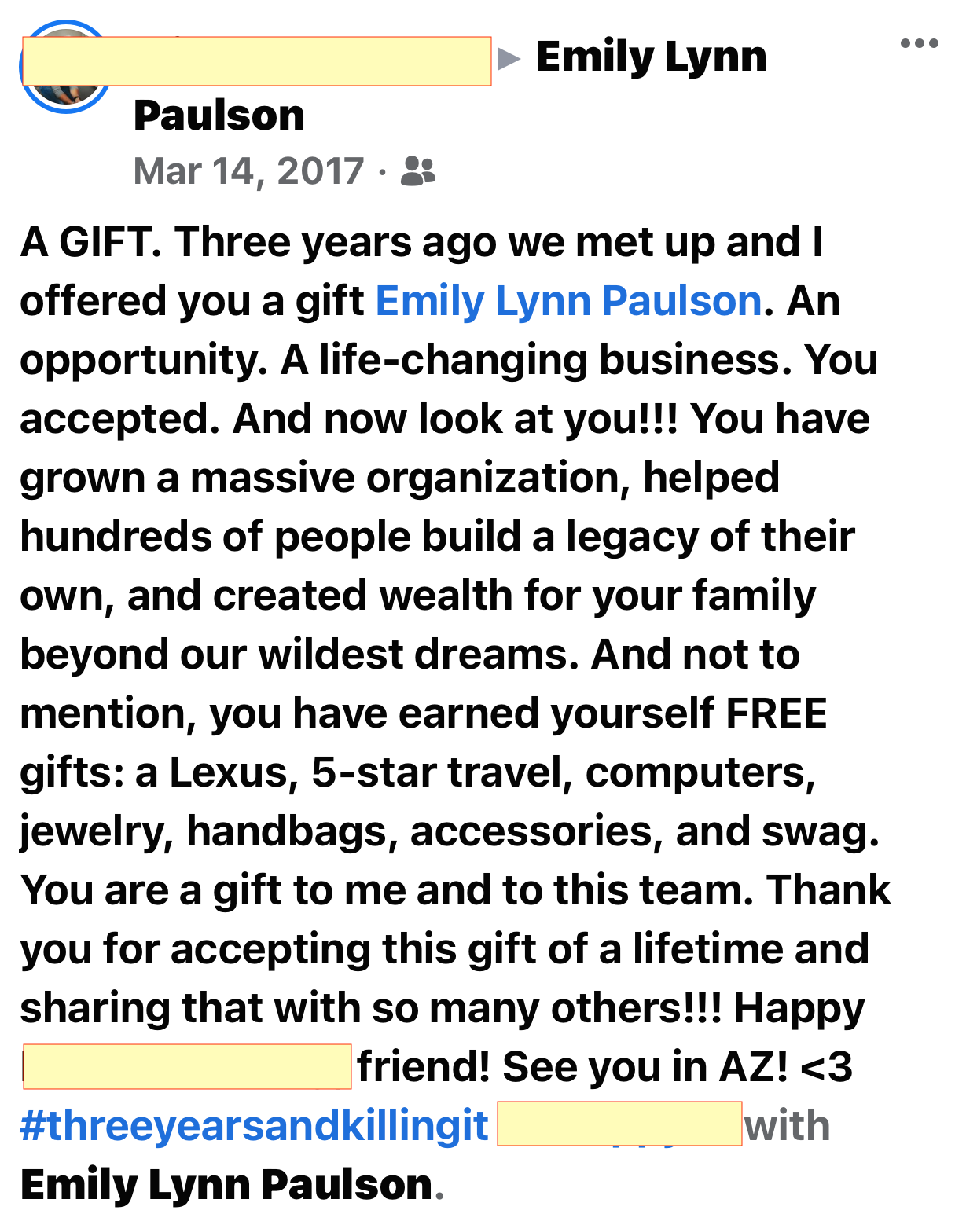


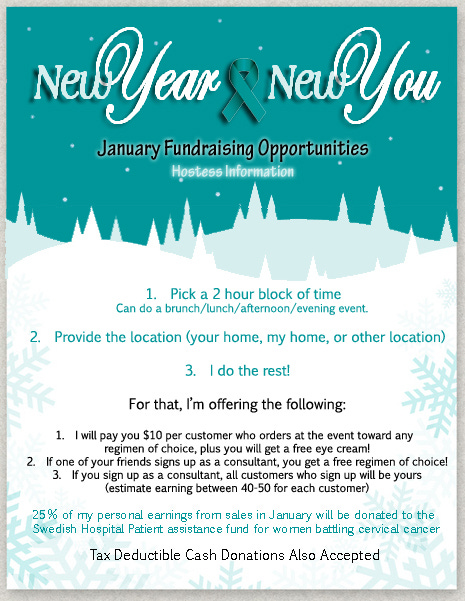

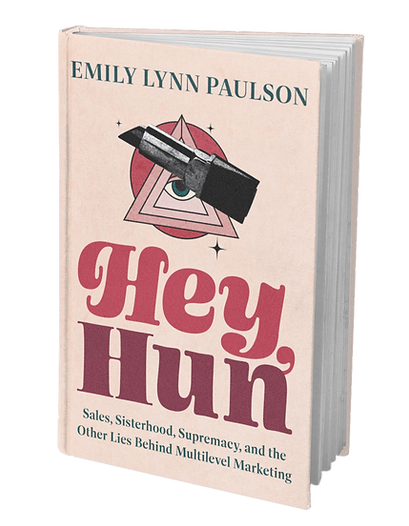
Loved this interview so much! I also love the photos! I have countless cringe photos from my own MLM days (😬) Thank you Laura for using your platform to discuss MLMs and the cult-like behavior that usually comes along with those $500 “welcome kits.”
Mathematically, plain retail sales from home, where each seller works directly for the manufacturer, can work for a majority of people who try it--but multi-level marketing, where each seller pays another seller and tries to recruit more sellers, canNOT work for the majority of people involved. If it's working for you, congratulations, you got in near the top of the pyramid, enjoy it while it lasts; it won't last long, and the people below you will probably not be your friends when it crashes.
Oh, not that MLM is all bad. I once spent $50 out of the last $100 I had to buy into a vitamin powder pyramid. I never sold any vitamins; the local market was already saturated. But telling a landlord that I was working, selling vitamins, kept me decently sheltered until I found a job that actually paid! And I learned how MLM works and would never buy into it again. Call it an immunization!
With the economic depression we can expect to see more people trying direct sales. I respect them for trying and appreciate the companies that make it possible for them. They need in turn to understand that I'm trying to earn my own living, my own way, and it's not always easy and I have to decide between lights and groceries. I will not be buying any designer luggage.
And if someone you don't know VERY well calls you something like "Hun," or says it in a public place..."Hun" is in fact hatespeech, and even if some people claim it's not, "honey" is, too. If the person seems competent enough to play a verbal abuse game, I ask whether the person meant primarily to be racist, sexist, vulgar, or obscene, since "honey" qualifies on all four counts.
(If anyone who reads this *has* been addressing women who don't share their homes by anything that sounds like a term of endearment as distinct from a term of respect, you need to stop that now. Even if you use a less loathsome word than "honey" or "baby," a word that a close friend or relative might use...just STOP. I'm not *your* sister. I'm not *your* aunt. I'm not *your* "Darling." People who are close to me do not CALL a person who's already there, and continual "calling" as if for repeated assurance that I'm still there, when you can see me standing right in front of you, does make me wonder about your competence. The best choice is usually not to call at all. If you can't keep those "calls" from popping out, kindly observe the grey hair, undyed, flaunted, and call me "Ma'am.")